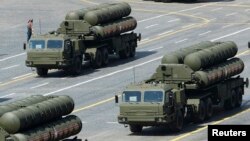The United States is assessing the security implications of Russia's latest deployment of S-400 air defenses to Crimea, a U.S. military official said on Tuesday, adding it could give existing Russian defenses more resilience.
"It's not good. It doesn't bode well," a senior U.S. official at the U.S. military's European Command said, speaking on condition of anonymity. "We certainly are paying attention to it and what that means, as far as the security of the Black Sea."
Moscow's deployment on Saturday added a second division of S-400 surface-to-air missiles in Crimea, which Russia annexed from Ukraine in 2014, triggering economic sanctions by the European Union and United States.
It deployed its first division of S-400s in the spring of 2017 near the port town of Feodosia. The new division will be based next to the town of Sevastopol and will control the airspace over the border with Ukraine, the RIA news agency reported.
The U.S. military official acknowledged that it was difficult to assess the goal of the deployment. Any air defenses of that kind, however, add Russian military capability to Crimea, providing additional resilience and, potentially, coverage.
"If the intent should arise, it gives opportunities to either defend a little bit more of the Black Sea or to advance from there," the official said, without predicting any future Russian actions.
"We look at it as just another affirmation of their will to use military force."
New fighting
Ukraine and pro-Russian separatists have accused each other in recent days of ramping up attacks in their conflict.
Five Ukrainian servicemen have been killed so far this year and another roughly 20 were wounded, according to Reuters calculations based on daily data from the Ukrainian military.
The new air defense system, designed to defend Russia's borders, can be turned into combat mode in less than five minutes, Interfax news agency quoted Viktor Sevostyanov, a commander with Russia's air forces, as saying.
Russian officials have criticized a U.S. decision announced in December to provide Ukraine with defensive weaponry, which officials said included Javelin anti-tank missiles.
Washington has argued in the past that such weapons cannot effectively be used to take territory and U.S. Marine General Joseph Dunford said during a trip to Brussels this week that the move was strictly defensive.
"Our government believes that a nation has the right to defend itself and the support that we've provided to Ukraine was directly focused on areas where they had capability gaps," Dunford said.





